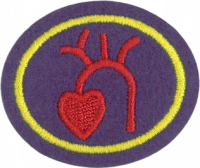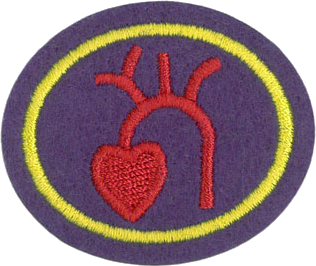Difference between revisions of "AY Honors/Heart and Circulation/Requirements"
Jomegat bot (talk | contribs) m (Jomegat bot moved page AY Honor Heart and Circulation Requirements to AY Honor Heart and Circulation Requirements: Bot: Moved page) |
m |
||
| (7 intermediate revisions by 2 users not shown) | |||
| Line 1: | Line 1: | ||
| − | + | {{HonorSubpage}} | |
| − | |||
| − | |||
| − | + | <section begin=Body /> | |
| − | |||
| − | <b> | + | <b>1. <section begin=req1 /><noinclude><translate><!--T:1--> |
| − | <section end= | + | </noinclude>Describe the basic function of the following parts of the circulatory system: heart, blood vessels, blood, and lungs. |
| + | <noinclude></translate></noinclude><section end=req1 /></b> | ||
| − | <b> | + | <b>2. <section begin=req2 /><noinclude><translate><!--T:2--> |
| − | <section end= | + | </noinclude>Describe the major difference between arteries and veins. What is a capillary and what is its function? |
| + | <noinclude></translate></noinclude><section end=req2 /></b> | ||
| − | <b> | + | <b>3. <section begin=req3 /><noinclude><translate><!--T:3--> |
| − | <section end= | + | </noinclude>Identify two locations for measuring your pulse. Demonstrate your ability to accurately take someone's pulse. |
| + | <noinclude></translate></noinclude><section end=req3 /></b> | ||
| − | <b> | + | <section begin=challenge /> |
| − | <section end= | + | <b>4. <section begin=req4 /><noinclude><translate><!--T:4--> |
| + | </noinclude>Record your resting pulse rate, then exercise strenuously (ie jog, swim laps, climb stairs, etc.) for 10 minutes. Retake your pulse immediately after exercising, and then again after five minutes. Do this each day for one week recording your results on a chart or a graph. Did the exercise affect your heart rate? | ||
| + | <noinclude></translate></noinclude><section end=req4 /></b> | ||
| + | <section end=challenge /> | ||
| − | <b> | + | <b>5. <section begin=req5 /><noinclude><translate><!--T:5--> |
| − | <section end= | + | </noinclude>Make a simple stethoscope and listen to someone’s heart beat. |
| + | <noinclude></translate></noinclude><section end=req5 /></b> | ||
| − | <b> | + | <b>6. <section begin=req6 /><noinclude><translate><!--T:6--> |
| − | <section end= | + | </noinclude>List at least five things you can do to keep your heart healthy. Put these into practice if you have not been doing so already. |
| + | <noinclude></translate></noinclude><section end=req6 /></b> | ||
| − | <b> | + | <b>7. <section begin=req7 /><noinclude><translate><!--T:7--> |
| − | <section end= | + | </noinclude>What is cholesterol and how is it related to arteriosclerosis? |
| + | <noinclude></translate></noinclude><section end=req7 /></b> | ||
| − | <b> | + | <b>8. <section begin=req8 /><noinclude><translate><!--T:8--> |
| − | <section end= | + | </noinclude>What is a heart attack and what are its symptoms? How can CPR help? |
| + | <noinclude></translate></noinclude><section end=req8 /></b> | ||
| − | <b> | + | <b>9. <section begin=req9 /><noinclude><translate><!--T:9--> |
| − | < | + | </noinclude>What is an ECG and how is it used by a doctor? |
| + | <noinclude></translate></noinclude><section end=req9 /></b> | ||
| − | + | <b>10. <section begin=req10 /><noinclude><translate><!--T:10--> | |
| − | + | </noinclude>Find five verses in the Bible that refer to your heart. Memorize two of them. | |
| + | <noinclude></translate></noinclude><section end=req10 /></b> | ||
| + | <section end=Body /> | ||
Latest revision as of 02:15, 4 January 2023
1. Describe the basic function of the following parts of the circulatory system: heart, blood vessels, blood, and lungs.
2. Describe the major difference between arteries and veins. What is a capillary and what is its function?
3. Identify two locations for measuring your pulse. Demonstrate your ability to accurately take someone's pulse.
4. Record your resting pulse rate, then exercise strenuously (ie jog, swim laps, climb stairs, etc.) for 10 minutes. Retake your pulse immediately after exercising, and then again after five minutes. Do this each day for one week recording your results on a chart or a graph. Did the exercise affect your heart rate?
5. Make a simple stethoscope and listen to someone’s heart beat.
6. List at least five things you can do to keep your heart healthy. Put these into practice if you have not been doing so already.
7. What is cholesterol and how is it related to arteriosclerosis?
8. What is a heart attack and what are its symptoms? How can CPR help?
9. What is an ECG and how is it used by a doctor?
10. Find five verses in the Bible that refer to your heart. Memorize two of them.


